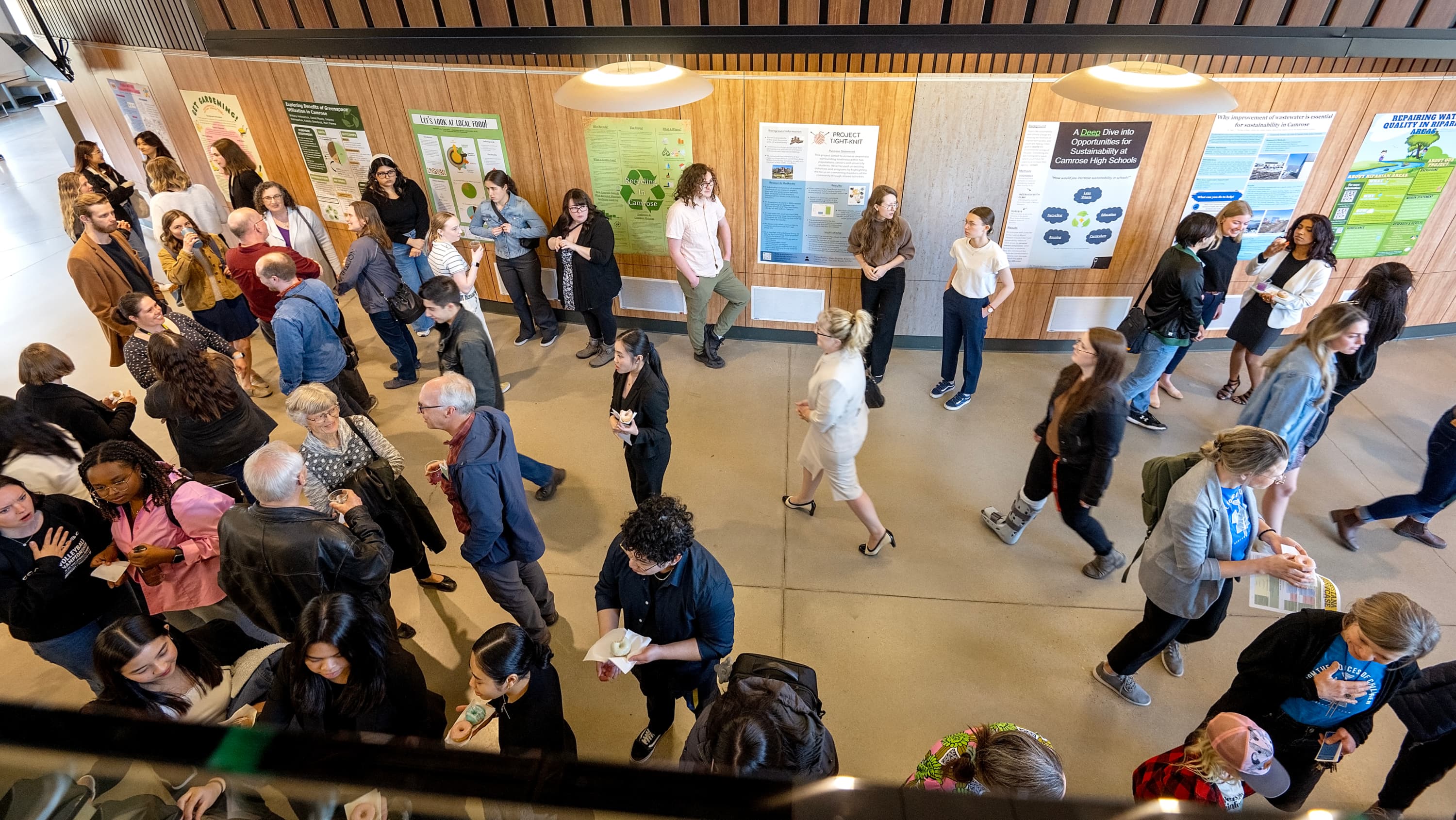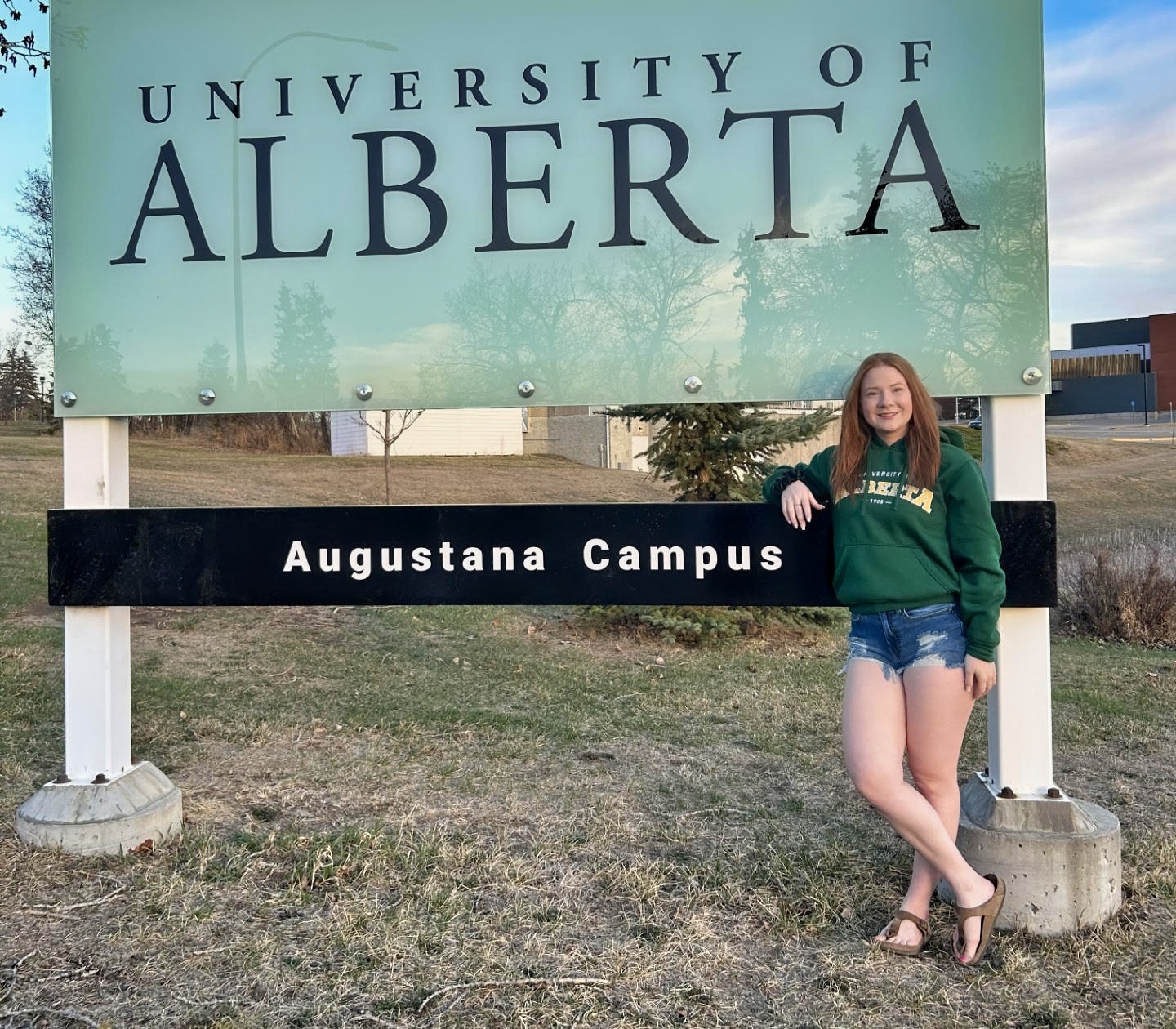Carly Rombs hadn’t given much thought to how something as simple as touring a museum could be challenging for people with disabilities.
But that changed after the University of Alberta Augustana Campus student took a workshop on inclusivity and diversity, then partnered with classmates to create a virtual tour for a small community museum that included text and audio.
“Almost everywhere I go now, I notice if there’s no ramp for a wheelchair, or I think maybe I should speak more slowly for people who are hard of hearing. I’m able to visualize myself in their shoes,” says Rombs.
The project, aimed at solving a challenge for a community group, was one of the rich learning experiences she’ll carry with her from four mandatory core courses every Augustana student takes throughout their university careers.
Launched in 2020, the courses all offer learning skills like critical thinking, communication, collaboration and conducting research, giving students a competitive advantage when applying for jobs or further studies, says Augustana science professor Brian Rempel, who helped develop and teach some of the curriculum.
“Employers are looking for professionals who have experience working on a problem from multiple angles as part of a team, and these core courses provide exactly that training. They get students out of the classroom and into the wider world.”
“The core courses made me a better student — and a better person, I think,” Rombs notes. “I had so many valuable experiences that helped me get where I am today as I continue my studies.”
Now working on a U of A master of science degree in physical therapy after earning a bachelor of arts in physical education, Rombs believes the well-rounded experience she got from the core courses helped her successfully apply for graduate studies.
One of her program’s orientation questions was how well the applicants worked with others, and while she noticed her classmates were unsure of those skills, “I realized I had done this my whole university career. I felt I had an advantage, that I was almost extra prepared.”
Building a base of sought-after skills
The courses build on one another, starting with AUIDS 101, a first-year seminar that gets students thinking about a topic from several angles. Ranging from dinosaurs to beer, the fun lecture topics give students the starter skills they’ll need to succeed in university, Rempel notes.
“Along the way to answering a question like, ‘What is the best dinosaur?’ they can end up discovering some good academic skills as well. They’ll all do some form of academic writing, learn how to search for and cite sources of information, write a good thesis statement and give an oral presentation in front of a class, all within the first three weeks of their education.”
“It showed how to creatively prove points, say, in a workplace situation,” says Rombs. “We are moving away from the idea that just one way is the right way.”
The second course, AUIDS 201, gets students working together to complete a class project, preparing them for more intensive teamwork.
As a new student gradually building her skills, Rombs was grateful for the “baby steps” she learned. “It helped bridge the gap going from a lecture-style class to working in a group.”
The final two core courses ramp up students’ ability to solve problems and work independently.
The third course, AUIDS 301, pairs the students with community groups — such as the local museum — to solve a particular challenge.
The experience gives community groups a useful end product, while students get an idea of how to apply their education and skills in the working world, Rempel says.
“The hope is that they see they are already making a positive change in the world, and what they do matters to the community around them.”
“It was creating an impact larger than I thought I could create,” Rombs adds. “You don’t think of pairing with the community when you go to school. Being able to help them out while learning valuable lessons was the best part for me.”
The fourth course, AUIDS 401, was introduced last winter, “to bring together everything the students have learned in the core courses to solve what we call a ‘wicked problem,’” loosely based on 16 global challenges identified as research priorities by the Social Science and Humanities Research Council of Canada, says Rempel.
“These are the larger complex topics we ask the student teams to look at, and then propose a solution to one part of the problem.”
The course presses students from diverse areas of study to work closely together, deeply explore and research an issue, then create and present work that offers a solution.
Rombs and her classmates designed their projects to address a social concern — in this case isolation and loneliness.
Her team created a fictional game loosely based on the television show The Amazing Race, designed to bring people together socially in friendly competition. Getting the assignment from start to finish was a lesson in thinking critically, Rombs says.
“While we weren’t actually implementing the event, we still had to think everything through, down to minute details, and it helped me think from different perspectives.”
“Conscientious colleagues and citizens”
The students developed other skills along the way, including writing resumés and cover letters, designing a project budget and learning to network.
They were encouraged to work with minimal supervision, which Rombs says strengthened her communication skills and how to deal with conflict. “I also reflected on how I could be a better groupmate.”
In addition, the students attended workshops on workplace culture, noted Brandon Alakas, associate dean of academic programs at Augustana, who also piloted the course.
“We want to give them the tools to not only succeed in the workforce, but to become conscientious colleagues and citizens.”
Teaching both the first and fourth core courses, Alakas watched students like Rombs blossom from “timid” first-years into self-assured graduates by the time they finished.
“I saw students who felt confident both in pursuing multiple, complex tasks at once and in facing the different challenges to come after finishing their undergraduate programs. It helped demystify what happens after they graduate.”
The courses helped Rombs determine “what I am going to be like going forward,” she says.
“I’ve developed professionalism and I’ve learned skills that aren’t overtly taught, but give me the opportunities to make the world a better place — not just for me, but for the future.”

